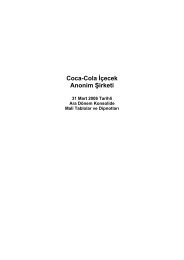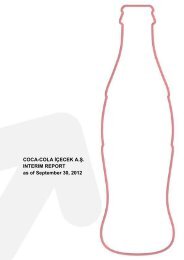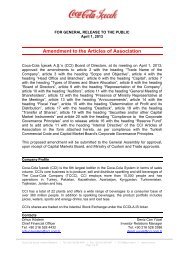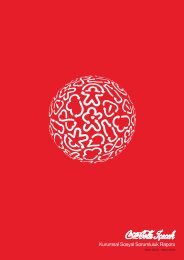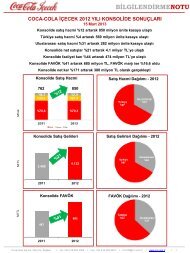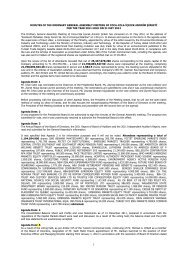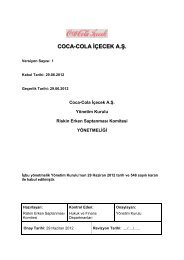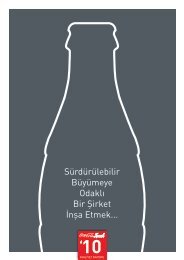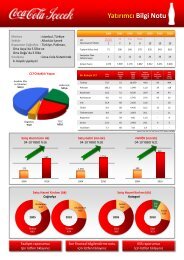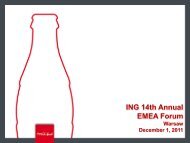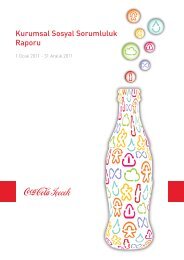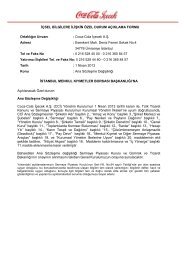Government and the IMF signed a three-year stand-by agreement, which required the Government to implement certain policychanges and structural reforms. The reforms contributed to economic growth but the economy is still vulnerable to volatility,changes in investor sentiment and political uncertainty. In May 2005, the Government entered into a new three-year stand-byagreement with the IMF. The IMF's support is contingent on Turkey's compliance with the restrictions contained in the stand-byagreement. There can be no assurance that Turkey will be able to meet the conditions of the IMF agreement or that IMF supportfor Turkey will continue.Future negative developments in the Turkish economy could impair our business strategies and have a materiallyadverse effect on our financial condition and results of operations.Political developments in Turkey may have a material adverse effect on our business, financial condition and results ofoperations in the future.Turkey has been governed by a parliamentary democracy since 1923, although the military has in the past played asignificant role in politics and the Government, intervening in the political process through coups in 1960, 1971 and 1980.Unstable coalition Governments have been common, and in the over 80 years since its formation, the Republic of Turkey hashad 59 Governments with political controversies frequently resulting in early elections. The latest in a series of early elections,the national elections held on November 3, 2002 resulted in victory of the Justice and Development Party ("AKP"), which isknown to have Islamic roots. AKP, led by Recep Tayyip Erdoğan, received 34.1% of the votes cast and formed a single partyGovernment in the Grand National Assembly ("GNA"). AKP declared that it would continue to implement the current IMFprogram and the economic policies introduced by the former Government with minor revisions. To date, AKP's economicpolicies have complied with the IMF program and have relatively stabilized the Turkish economy, as discussed above. The nextnational election is expected to be held by 2007 and a change of Government at the next election could lead to a change ineconomic policies. The failure to continue to implement the IMF program may have an adverse effect on the Turkish economyand, as a result, on our financial condition and results of operations.The head of state in Turkey is the President of the Republic of Turkey, who is elected by the GNA. The currentPresident, Ahmet Necdet Sezer, the former head of the Constitutional Court, was elected in May 2000 for a seven-year termwhich will terminate in May 2007. Pursuant to the Constitution, a President cannot be elected twice. The President has had avolatile relationship with the governments formed by the AKP and has vetoed several pieces of legislation passed by the GNA.Increased instability in the Government, including additional conflicts among senior politicians in Turkey, as well as increasedpolitical instability in the Middle East, may adversely affect the Turkish economy, which in turn could adversely affect ourbusiness.Terrorism within Turkey or conflicts in Turkey's neighboring countries may have a material adverse effect on our businessand results of operations in the future.Political uncertainty within Turkey and in certain neighboring countries, such as Iran and Iraq, has historically been oneof the potential risks associated with investment in Turkish companies. Political instability in the Middle East and elsewhereremains an area of concern. The four bombings in Istanbul in November 2003 appear to have had a limited impact on theTurkish economy. However, if similar attacks occur in the future, Turkey's capital markets, as well as the levels of tourism andforeign investment in Turkey, may suffer. In addition, the bombings in the coastal holiday resorts of Çeşme and Kuçadası inJuly 2005 and the threat of future terrorism have had and could continue to have an adverse effect on the Turkish economy.It is possible that further acts of terrorism may be directed against American interests in Turkey, and such acts ofterrorism could be directed against properties and personnel of companies such as ours which are associated with Americaninterests. While our property and business interruption insurance covers damages to insured property directly caused byterrorism, we cannot be certain that such amounts will be sufficient to cover any losses we may incur.Turkey has also had problems with terrorist and ethnic separatist groups in past years. For example, Turkey has been inconflict with the Peoples' Congress of Kurdistan, formerly known as the PKK. After seven years of relative peace, this group hasrecommenced its terrorist attacks mostly in the southeastern part of Turkey but also in Istanbul. If such terrorist attacks continue,it may adversely affect tourism and the Turkish economy, which in turn could adversely affect our business.Uncertainties relating to European Union membership may adversely affect our operating environment and our results ofoperations.Turkey has had a long-term relationship with the European Union. In 1963, it signed an association agreement with theEuropean Union and in 1970 a supplementary agreement was signed providing for a transitional second stage of Turkey's
integration into the European Union. The European Union resolved on December 17, 2004 to commence accession negotiationswith Turkey and affirmed that Turkey's candidacy will be judged on the same criteria applied to other candidates. These criteriarequire a range of political, legislative and economic reforms to be implemented. Negotiations for Turkey's accession to theEuropean Union commenced on October 4, 2005. No assurance can be given that Turkey will be able to meet the criteriaapplicable to becoming a member state of the European Union or that the European Union will maintain its current approachregarding the candidacy of Turkey. Uncertainties relating to Turkey's admission to the European Union may adversely affect theTurkish economy in general, which could adversely affect demand for our products.The level of inflation in Turkey could adversely affect our business.Over the five-year period ended December 31, 2000, the Turkish economy experienced annual inflation averagingapproximately 65.1% per year as measured by the Turkish wholesale price index. In response, the Government implementedpolicies intended to combat these persistently high levels of inflation. However, as a result of the financial crises experienced inTurkey in November 2000 and February 2001, during 2001 the wholesale price index increased to 88.6%. In line with the standbyarrangements with the IMF, the Government started implementing certain austerity measures to reduce public sector debt andto control inflation. The inflation rate based on the wholesale price index declined from 30.8% in 2002 and 13.9% in 2003 to13.8% in 2004 and to 4.5% in 2005.The implementation of certain austerity measures proposed by the Government to control inflation could have anadverse effect on the Turkish economy and on the value of Turkish equity securities. Although the rate of inflation has decreasedin recent years, there can be no assurance that this trend will not reverse, particularly if the Turkish government fails to continueits current economic policies or if those policies cease to be effective. If the level of inflation in Turkey were to fluctuatesignificantly, it is possible that the market price of our Class C Shares would be adversely affected. Increases in the level ofinflation also could require us to increase the prices of our beverages, which could adversely affect our sales.The state of the current account deficit in Turkey could lead to depreciation of the New Turkish Lira and increased inflationwhich could adversely affect our business, results of operations and financial condition.With the economy expanding, interest rates low, inflation declining and productivity gains at record highs, the NewTurkish Lira appreciated by almost 48.0% from the end of 2001 to the end of March 2006 according to the Central Bank'sconsumer price index based Real Effective Rate Index. However, given the widening current account deficit and the resultingsurge in financing needs, some Turkish economists are concerned about the stability of the New Turkish Lira. Turkey had acurrent account deficit of $7.9 billion in 2003 (3.3% of gross national product). In 2004, the current account deficit increased to$15.6 billion, accounting for 5.2% of gross national product, and in 2005 the deficit reached $22.9 billion, or 6.3% of grossnational product. In a period of uncertainty, the persistent widening of the current account deficit may lead to a suddenadjustment in the New Turkish Lira with inflationary consequences.Future earthquakes could damage our facilities and the Turkish economy in general.On August 17, 1999, an earthquake measuring 7.4 on the Richter scale struck the area surrounding Izmit. OnNovember 12, 1999, another earthquake occurred in the city of Düzce, between Ankara and Istanbul, resulting in furtherfinancial costs to Turkey. Almost all of Turkey is classified by seismologists as being in a high risk earthquake zone. Almost45% of Turkey's population and most of its economic resources are located in a first degree earthquake risk zone (the zone withthe highest level of risk of damage from earthquakes). Our headquarters and our Çorlu and Bursa production facilities arelocated in first degree earthquake risk zones, our Ankara and Kemalpaşa production facilities are located in second degreeearthquake risk zones and our Mersin production facility is located in a third degree earthquake risk zone. The occurrence of asevere earthquake could affect one or more of our production facilities and cause an interruption in our business, which wouldhave an adverse effect on our business. In addition, a severe earthquake could harm the Turkish economy in general, whichcould adversely affect demand for our products.Risks Relating to Operating in KazakhstanKazakhstan has a relatively short history as an independent state and there remains potential for instability that could have amaterial adverse effect on our business, financial condition and results of operations in Kazakhstan.Kazakhstan's existence as an independent state resulted from the break-up of the Soviet Union. Kazakhstan's president,Nursultan Nazarbayev, has been in office since Kazakhstan became an independent sovereign state in 1991. As such, it has arelatively short history as an independent nation and there remains potential for social, political, economic, legal and fiscalinstability. These risks include, among other things, local currency devaluation, civil disturbances, changes in exchange controls
- Page 1 and 2: OFFERING MEMORANDUM CONFIDENTIAL5,0
- Page 4 and 5: Neither we, the selling shareholder
- Page 7 and 8: ENFORCEABILITY OF CIVIL JUDGMENTSCC
- Page 9 and 10: PRESENTATION OF FINANCIAL AND OTHER
- Page 11 and 12: FORWARD-LOOKING STATEMENTSThis offe
- Page 13 and 14: market in Europe for products of Th
- Page 15 and 16: The OfferingThe International Offer
- Page 17 and 18: corresponding figures for previous
- Page 19 and 20: 2004 and 2005, respectively, and 32
- Page 21 and 22: Sales of alcohol-free beverages are
- Page 23: Our principal shareholders have the
- Page 27 and 28: part of governmental authorities; a
- Page 29 and 30: of all of the companies with equity
- Page 31 and 32: • the remainder of the net profit
- Page 33 and 34: In February 2005, the SIS substitut
- Page 35 and 36: statutory books is slightly lower t
- Page 37 and 38: 2005 2004 2003(audited)(in thousand
- Page 39 and 40: Minority share ownership...........
- Page 41 and 42: on the consolidated balance sheets.
- Page 43 and 44: "Package mix" refers to the relativ
- Page 45 and 46: to the total amount of qualifying c
- Page 47 and 48: Xpress in April 2005. These increas
- Page 49 and 50: We had net other expense of YTL12.3
- Page 51 and 52: Marketing and advertising expense i
- Page 53 and 54: Net cash used in investing activiti
- Page 55 and 56: In 2004, the increase in net workin
- Page 57 and 58: upon with the bank on a case-by-cas
- Page 59 and 60: Interest Rate RiskOur interest rate
- Page 61 and 62: We record a valuation allowance to
- Page 63 and 64: Attractive Growth MarketsWe operate
- Page 65 and 66: In June 1996, The Coca-Cola Company
- Page 67 and 68: The following table compares the pe
- Page 69 and 70: have received special authorization
- Page 71 and 72: 2005 2004 2003Unit CaseSales Volume
- Page 73 and 74: The sports drinks segment is a rela
- Page 75 and 76:
Indirect DistributionIn addition to
- Page 77 and 78:
CC Kazakhstan was established in 19
- Page 79 and 80:
CC Kazakhstan's share of the bottle
- Page 81 and 82:
We believe that Azerbaijan's demogr
- Page 83 and 84:
Piko (2) ..........................
- Page 85 and 86:
consolidation in recent years and,
- Page 87 and 88:
The following table shows the packa
- Page 89 and 90:
"Peak season production capacity" i
- Page 91 and 92:
Turkey:Ankara......................
- Page 93 and 94:
We intend to explore possible syner
- Page 95 and 96:
and producers and distributors, whi
- Page 97 and 98:
We have implemented systems that we
- Page 99 and 100:
(2) These properties are not curren
- Page 101 and 102:
Our senior management is responsibl
- Page 103 and 104:
Group, Mr. Zorlu worked for Turkish
- Page 105 and 106:
Consistent with our commitment to l
- Page 107 and 108:
Anadolu EfesEstablished in 1966, An
- Page 109 and 110:
Coca-Cola Company may, in its sole
- Page 111 and 112:
distribution or sale of any product
- Page 113 and 114:
certain approved containers of The
- Page 115 and 116:
Resolution the Trade RegistryGazett
- Page 117 and 118:
Class B Shareholders pursuant to wh
- Page 119 and 120:
Notices covering general meetings (
- Page 121 and 122:
In the event any party or parties a
- Page 123 and 124:
AuditorsPursuant to our articles of
- Page 125 and 126:
implementation of the New Turkish L
- Page 127 and 128:
Insider TradingInsider trading is d
- Page 129 and 130:
The Republic of TurkeyThe following
- Page 131 and 132:
Gains from the sale, exchange, or o
- Page 133 and 134:
• certain former citizens or long
- Page 135 and 136:
Subject to the discussion below und
- Page 137 and 138:
In addition, until 40 days after th
- Page 139 and 140:
(1) The purchaser acknowledges that
- Page 141 and 142:
In our opinion, the consolidated fi
- Page 143 and 144:
Coca-Cola İçecek Anonim Şirketi
- Page 145 and 146:
Coca-Cola İçecek Anonim Şirketi
- Page 147 and 148:
a) the restatement for changes in t
- Page 149 and 150:
• Non-monetary assets and liabili
- Page 151 and 152:
The functional currency of Efes Sı
- Page 153 and 154:
Goodwill arising from acquisitions
- Page 155 and 156:
Financial assets and liabilities ar
- Page 157 and 158:
121,424 88,516 78,7545. INVESTMENTS
- Page 159 and 160:
Accumulated Impairment .... (8,123)
- Page 161 and 162:
Management premium /bonus accrual f
- Page 163 and 164:
The legal reserves are not availabl
- Page 165 and 166:
The Group is subject to taxation in
- Page 167 and 168:
The Group's objective is to maintai
- Page 169 and 170:
OtherBeverage Partners Worldwide...
- Page 171 and 172:
Cash and cash equivalents .........
- Page 173 and 174:
Efes Sınai Yatırım Holding Anoni
- Page 175 and 176:
1. CORPORATE INFORMATIONGeneralEfes
- Page 177 and 178:
Trade receivables—net ...........
- Page 179 and 180:
Investments classified as available
- Page 181 and 182:
arising from the business combinati
- Page 183 and 184:
differences will reverse in the for
- Page 185 and 186:
Less impairment for ACCB and Kuban
- Page 187 and 188:
2005 2004Trade accounts payable....
- Page 189 and 190:
2005 2004Net profit attributable to
- Page 191 and 192:
Total depreciation and amortization
- Page 193 and 194:
For the purposes of consolidated fi
- Page 195 and 196:
Political and Economic Environment
- Page 197 and 198:
Credit risk arises from the possibi
- Page 199 and 200:
2004Domestic Foreign Elimination Co
- Page 201 and 202:
Efes Sınai Yatırım Holding Anoni
- Page 203 and 204:
Efes Sınai Yatırım Holding Anoni
- Page 205 and 206:
Dış Ticaret Ltd. Şti.)(*) The li
- Page 207 and 208:
activities. The equity and net inco
- Page 209 and 210:
The Group presents assets subject t
- Page 211 and 212:
Deferred income tax is provided, us
- Page 213 and 214:
2004 2003ACCB......................
- Page 215 and 216:
The effective interest rates at the
- Page 217 and 218:
There have been no other transactio
- Page 219 and 220:
Major components of income tax expe
- Page 221 and 222:
Balances with related parties as of
- Page 223 and 224:
Bishkek CC is subject to corporate
- Page 225 and 226:
The Group does not hedge its foreig
- Page 227 and 228:
ANNEX ASUMMARY OF CERTAIN SIGNIFICA
- Page 229 and 230:
As to U.S. LawAs to Turkish LawWhit



